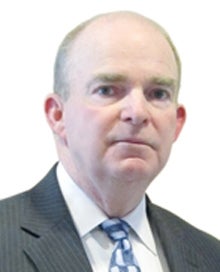If you’re a chief financial officer or finance director, the coming year might end up feeling like more of the same. The economy is predicted to continue its recovery, albeit on a slow trajectory, with Massachusetts continuing to outpace the national average. Of course, anything can happen. But here are five general trends to watch for in 2012, gleaned from interviews with executives and experts within and outside Central Massachusetts.
(1) Companies will still maintain large cash buffers.
Think companies are going to stop hoarding cash in 2012? Think again. Companies won’t soon forget the recession lesson they have learned about keeping cash reserves, said David D. Lorenzi, a CPA and partner at Wayland-based Paresky Flitt & Co.
“There’s an emphasis on building the balance sheet,” Lorenzi said. “They’re storing equity in the company so the company is financially able to ride out rough stretches of time.”
Economists such as Northeastern University’s Alan Clayton-Matthews have said companies generally won’t use stored-up cash to hire new workers or expand until demand for their products and services increases.
(2) Health insurance costs will continue to climb.
No real surprise here, but expect employee health insurance costs to increase in 2012.PricewaterhouseCooper’s Health Research Institute predicts an 8.5 percent jump nationwide compared to 8 percent this year. And HR consultant Aon Hewitt predicted last month that coverage costs per employee nationwide will cross the $10,000 mark for the first time in 2012.
Here in the Bay State, Gov. Deval Patrick successfully pressured insurers this year to keep cost increases below 10 percent. Cost-containment legislation filed earlier this year takes aim at the state’s high health care costs by shifting payment models, among other strategies. But with 2012 right around the corner, businesses likely won’t see positive impacts in their 2012 budgets.
(3) Small business lending could dip.
The U.S. Small Business Administration is coming off a record year in which it supported $30.5 billion in loans.
But federal stimulus money provided loan incentives to both banks and borrowers that drove up demand for loans. Barring additional action from Congress, those incentives are gone, and the SBA has set a lower cap on its popular 7(a) loan program in its 2012 budget request. The agency’s requested 2012 budget is 45 percent lower than its 2010 budget, when it swelled with stimulus dollars, according to a budget overview on the SBA website. In 2012, the agency plans to subsidize $16.5 billion nationwide in 7(a) loans, a drop from $17.5 billion in 2011.
Robert Nelson, district director for the SBA’s Boston office, would not comment on the budget. (It’s not yet approved.) But he acknowledged that the stimulus money played a role in the record lending that took place this year.
“What we’re looking at for FY12, we’re looking at no stimulus provisions,” he said.
Michael Stamler, a spokesman for the SBA, said he thinks the “faucet will not run dry” in 2012, but he also doesn’t foresee a record quarter like that of a year ago, when the SBA backed $9 billion in three months. “We don’t expect that to happen absent a whole new, fresh round of incentives,” Stamler said.
(4) Banks and financial services firms will face tighter regulatory enforcement.
Banks and other financial services companies face new regulations from the Dodd-Frank Wall Street Reform and Consumer Protection Act, some of which have already taken effect. The bill cuts into financial services industry profits by capping debit card swipe fees for large banks, among other measures, and implements stricter reporting requirements for publicly traded companies.
Some smaller banks are concerned the large-bank regulations could eventually trickle down to them and are watching the Consumer Financial Protection Bureau’s actions closely.
William Mahoney, CFO at Whitinsville-based UniBank, said his company is weighing whether it needs to hire additional staff in 2012 to handle compliance. He said changes over the past year to regulations governing overdraft fees was one recent example of a rule in which the bank had to spend time and money to ensure compliance.
“It did increase the resources we had to devote to researching the new rules,” Mahoney said.
(5) Companies will spend more on IT.
Companies seeking cost savings and better business analytics will ramp up investments in information technology systems in 2012, according to a survey by Robert Half Management Resources.
Dennis Murphy III, CFO at D. Francis Murphy Insurance Agency in Hudson, said the trend holds true for his company, which is aiming for better information for its executives as well as convenience for its customers.
“When you look across other industries, and we see the direction they’re going with technology, it makes us realize the insurance business will be going in that direction too,” Murphy said.

